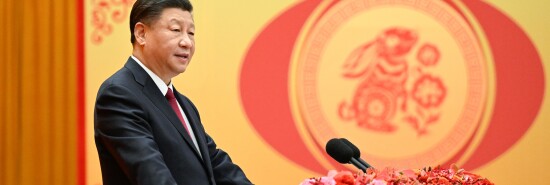
Psst, parents: There’s something between co-parenting with the government and going it alone
Timothy P. Carney
Video Embed
Should the Chinese Communist Party use the brutal force of the state to protect your children from bad cultural influences? Or should you be left to the wolves, trying to navigate the modern world without support?
If you follow the parenting discourse these days, you might think those are the only two options. I’m here to tell you, dear parents, that there is something between a communist central government and an isolated, rugged person.
Before I describe this mysterious middle institution, let me explain why I bring up the communists. A recent op-ed in the New York Times was headlined, “China Helped Raise My American Kids, and They Turned Out Fine.”
The writer, a mother and fashion designer named Heather Kaye, moved to China because her employer, Kate Spade, makes their expensive stuff using cheap Chinese labor. She writes that her children were, “in a way, co-parented by the Chinese government.”
After an awkward brief sentence about China’s recent “one-child policy” (“In China, government co-parenting begins in the womb”), Kaye begins with cultural norms rather than government policy: waitstaff coaxing her toward drinks assumed beneficial to babies or strangers rubbing her pregnant belly.
KAMALA HARRIS AWKWARDLY ADMITS SHE IS ANTI-LIFE
So, where does the government step in? First in school: The Communist Party-controlled schools “lectured us on everything,” she writes, and controlled the children’s lives pretty strictly. “We sometimes felt as if our children were on loan to us for evenings and weekends, to be delivered back to school each weekday.”
Then came the pro-fascist paragraph, which must be read in its entirety:
“Raising kids in China was a plus in other ways — such as the heavy censorship, which results in a kid-friendly internet, and national limits on how many hours young people can spend playing online video games. Ironically, the tight control of the Communist Party surveillance state results in its own kind of freedom: With crime and personal safety concerns virtually eliminated, our daughters were riding the subway unsupervised in a city of around 26 million people from the age of 11. A constant but benign (and mostly unarmed) police presence kept order; streets and the green spaces around every corner were kept immaculate, and the sense of civic pride was palpable.”
Don’t get me wrong: It’s good to keep children from bad stuff on the internet; crime is bad, and low-crime neighborhoods are liberating for children and, thus, for parents; public order and cleanliness are good. But if it takes a communist dictatorship to implement these things, it’s called fascism, and it’s bad.
So what? Do I think you should just let your children take in internet porn and trans propaganda on TikTok and get carjacked? Do I think schools should be value-free?
No. Not at all. What’s more, I agree with the author that “the strong sense of shared values” is crucial to raising children and that “attention to the common good is a fundamental value.”
My objection is to the notion that the government must do this all. The thing besides the central government that can help you raise your children — your “co-parent,” if you insist — is called culture, society, community, neighborhood, or friends.
Consider schools, a crucial institution of civil society. We aren’t supposed to believe our children are the property of the schools, as these parents in China felt. But we also shouldn’t jump to “just teach my kid to read, write, and multiply, and leave the values to us.”
Properly, parents are the primary educators of their children, and schools are the parents’ partners in that grand undertaking. A proper education doesn’t separate the academic from the moral. Parents, therefore, need schools that, at least to some extent, reinforce the morality the parents are trying to live out and teach at home.
This is why we need school choice, localism, and pluralism — all of which cut against the central planning of Communist China.
Regarding social media and the internet, there may be a few ways that federal law could effectively protect children while not treading on basic free speech rights. In the end, though, most of the policing will be done by parents.
What parents need on this score is a community that supports them in fending off social media and smartphones. Schools should ban smartphones and discourage social media among students. Governments and local organizations should stop making smartphones de rigueur by requiring student-athletes to have the app or attendees to have e-tickets on their phones.
Most of all, parents need to foster and plug into social ecosystems for their children that reject these apps and devices, and thus make it easier to say no to your teenager who wants an Instagram account.
Too many conservatives and libertarians think that a mother and a father can handle all the difficulties of raising children if they are just tough enough. That’s wrong. Parents need support.
But too many liberals lack the imagination to see that “support” need not be from the central government.
There’s something between the government and the household. It’s called community.
CLICK HERE TO READ MORE FROM THE WASHINGTON EXAMINER
